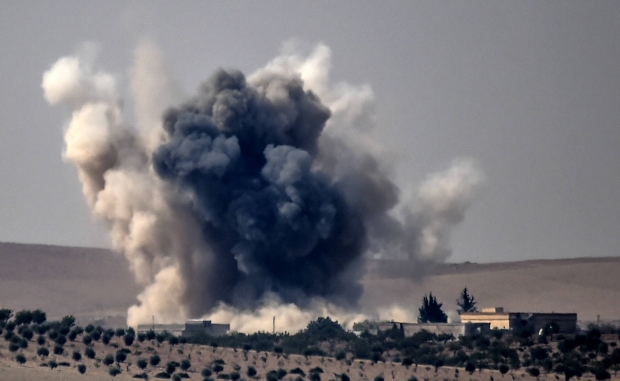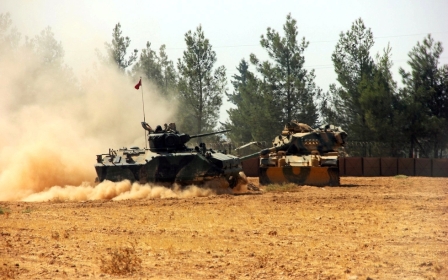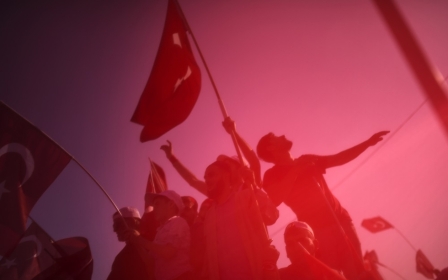Turkish tanks in Syria: Why Ankara is doing this

More than a month after the coup attempt of 15 July, Turkey is still reeling from the blow which some Turks compare to 9/11 in terms of the trauma it created.
So it was an especially cruel shock last weekend when the country suffered another heavy attack from a different direction. A suicide bomber, presumed by the authorities to come from IS and apparently around 12-years-old, detonated himself at a wedding party in the south-eastern industrial city – and Syrian refugee hub – of Gaziantep.
At least 54 people died in the explosion, 29 of them young children. The device was similar to that used in explosions in Suruc and Ankara last year in which links with IS were established.
There seems to be no headway in stopping the attacks or predicting where they will come next
The victims of the weekend’s atrocity were carefully selected. Much of Gaziantep’s population is ethnically Turkish but these were Kurds, linked to the leftist pro-Kurdish Peoples Democratic Party (HDP), who had come in for the occasion from other provinces such as Van and Hakkari.
Their deaths bring to 170 the total number of victims, including foreign tourists and those on the border, killed by IS in the last 12 months. Although suicide bombers have been identified in most cases from their DNA, and there are periodic round-ups and arrests of suspected members of IS, there seems to be no headway in stopping the attacks or predicting where they will come next. The last strike in Turkey by IS was on 28 June at the closely-guarded Istanbul airport where it killed 42 people.
Why Turkey has to look south of its borders for security
Left-wingers, Kurdish groups and Western tourists are the preferred targets in Turkey for IS. The group’s strategy seems to deter foreign tourists, drive an ever deeper wedge between Kurdish and socialist activists and the state, and intensify the sense that normal law and order are breaking down in the country.
It is one of four distinct terror organisations which the authorities have to contend with, the others being the Gulen movement, the PKK (Kurdistan Workers Party) and the hardline Marxist left which, uniquely in the Middle East, still exists in Turkey.
In Turkish official eyes, these terrorist adversaries blur into a single hostile entity, which some would like to suppose are in league with each other. But the antagonism between IS and the predominantly secularist Kurdish nationalist radicals is very intense and cuts across ethnic boundaries.
Many of IS’s adherents in Turkey are from the south-east. It is entirely possible that Kurdish supporters of IS were among those who carried out the Gaziantep bombing, rather than coming from the 400,000 Syrian refugees now living in the city alongside its 1.5 million inhabitants.
Once upon a time, Turkey and its internal conflicts were firmly sealed off from events across the border in Syria and Iraq, making it seem an island of relative peace in a turbulent region. But that division is now fading. Though the physical boundary between Turkey and Syria is closely guarded - and new walls are going up – the mixture of populations and conflicts between Turkey, the Kurds, and IS increasingly straddles both sides of the frontier and the conflicts on each side are starting to spill into each other.
Turkey and its internal conflicts were once firmly sealed off from events across the border in Syria and Iraq... that division is now fading
This reality complicates any attempts by Ankara to respond. Rounding up IS cells in Turkey is clearly not enough. In order to hit back at IS, Turkey has to look south of the border to where the problem comes from. Journalists close to the AKP began signalling on Tuesday that a major strike at Jarabulus in Syria by rebels supported by Turkey may be imminent.
On Monday morning, the foreign minister, Mevlut Cavusoglu, declared that the region to the south of the border “must be completely cleansed of IS forces”. It is an escalation from Monday’s when Turkish forces struck Jarabulus, a town in Syria just across the border, with howitzers and also bombarded the area north of Manbij, with long range artillery. The response was a further rocket attack by IS on the Turkish border town of Kilis the following morning.
How will this affect the Syrian Kurds?
The cross-border strikes on Monday seem to have hit some positions of the PYD (Democratic Union Party), the Syrian affiliate of the PKK. Kurdish sources say that Katyusha rockets fired by Turkish soldiers hit 10 positions of the Syrian Democratic Forces outside Manbij on Monday evening. There is an obvious irony in actions intended to punish terrorists who murdered Kurds in Turkey apparently hitting Kurdish targets in Syria as well as those belonging to IS. This happened because IS are not the only or even, from its point of view, the most dangerous adversaries Turkey now sees in northern Syria.
Nonetheless, from Turkey’s strategic position it has a certain logic. For Ankara, ending the autonomous Kurdish enclaves in northern Syria, which hug Turkey's southern borders, before they evolve into a de facto state is now probably a larger strategic objective than ousting President Bashar al-Assad.
Turkey indicated that it might agree to the Syrian president staying on during a transitional peace process
Indeed, Ankara and Damascus share a commitment to maintaining Syria’s territorial unity and preventing breakaways. This week Turkey indicated that it might agree to the Syrian president staying on during a transitional peace process.
So could Turkey make the forces of Assad its proxies against the Kurds? Wednesday's operations at Jarablus may point against this - but the possibility cannot be ruled out. It may seem unlikely after four years of bitter attempts to overthrow the Syrian leader. Yet last week Syrian government forces struck at Kurdish targets in the north-eastern Syrian town of Hasakah by land and air, encountering stiff Kurdish resistance. Some sort of behind the scenes dialogue is also apparently taking place. Turkish newspapers on Monday leaked news, admittedly unconfirmed, of a possible secret visit to Damascus by a senior member of Turkey’s intelligence services.
The latest operations could bring about a sea-change in the Syrian civil war. But for the victims of IS’s bombings in Gaziantep, Istanbul, Ankara, and other towns, there will be little comfort. The sleeper cells which strike at innocent people from out of nowhere will still be lying in wait.
David Barchard has worked in Turkey as a journalist, consultant, and university teacher. He writes regularly on Turkish society, politics, and history, and is currently finishing a book on the Ottoman Empire in the 19th century.
The views expressed in this article belong to the author and do not necessarily reflect the editorial policy of Middle East Eye.
Photo: A Turkish army tank drives towards Syria in the Turkish border city of Karkamis on 24 August (Bulent Kilic/AFP).
This article is available in French on Middle East Eye French edition.
New MEE newsletter: Jerusalem Dispatch
Sign up to get the latest insights and analysis on Israel-Palestine, alongside Turkey Unpacked and other MEE newsletters
Middle East Eye delivers independent and unrivalled coverage and analysis of the Middle East, North Africa and beyond. To learn more about republishing this content and the associated fees, please fill out this form. More about MEE can be found here.





